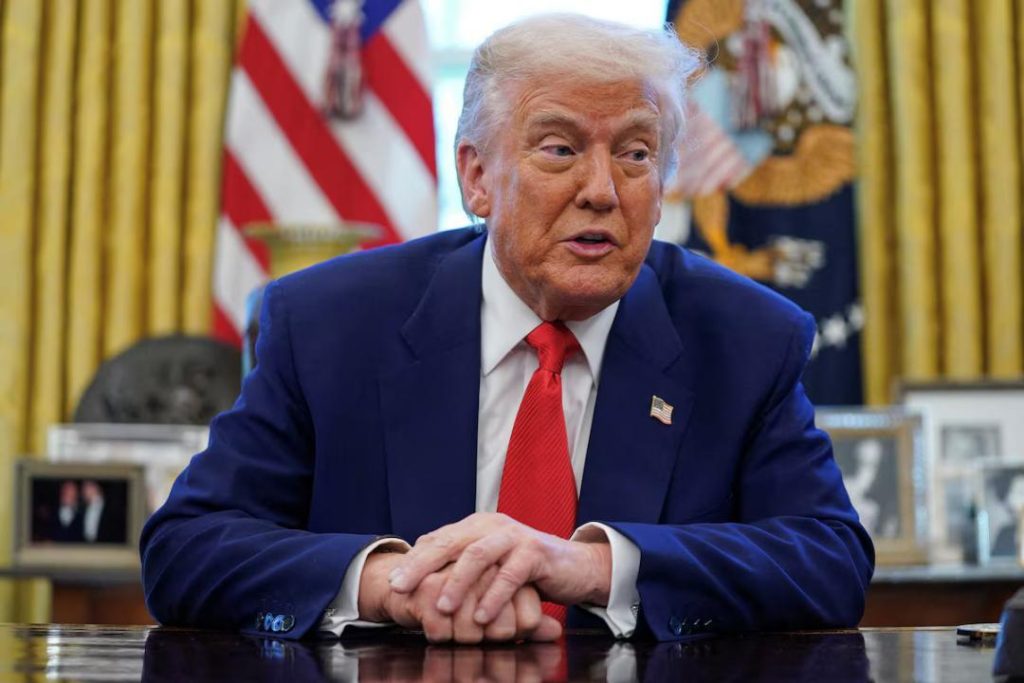
Title: Total Reset Negotiated: Donald Trump on US & China Trade Talks
Date: May 10, 2025
The United States and China have been engaged in a long and arduous trade war, with both countries imposing tariffs on each other’s goods. However, it seems that there may be a light at the end of the tunnel. The two nations have made significant progress in their trade talks, with US President Donald Trump announcing that a “total reset” has been negotiated. This development has sent shockwaves around the world, with investors and analysts alike trying to make sense of the implications.
According to reports, the trade talks between the US and China began in Geneva, Switzerland, and were characterized by a “friendly, but constructive” atmosphere. Trump himself took to social media to share his thoughts on the talks, stating that “great progress made” and that a “total reset negotiated” in a manner that was both “friendly and constructive”.
But what does this mean for the future of US-China trade relations? And what are the implications for the global economy? In this blog post, we’ll delve into the details of the trade talks and explore the potential consequences of this significant development.
The Trade War: A Brief Recap
The trade war between the US and China began in 2018, when the Trump administration imposed tariffs on Chinese goods worth $50 billion. China responded with its own set of tariffs, and the two nations have been locked in a cycle of retaliation ever since.
The trade war has had far-reaching consequences, including a decline in global trade, a surge in protectionism, and a significant impact on the global economy. The World Trade Organization (WTO) has warned that the trade war could lead to a global economic downturn, and the International Monetary Fund (IMF) has cut its global growth forecast as a result of the tensions.
The talks in Geneva mark a significant turning point in the trade war, and could potentially bring an end to the tariffs and other trade restrictions that have been imposed. But what did the two nations discuss, and what were the key takeaways from the talks?
The Key Takeaways
According to reports, the US and China discussed a range of issues during the talks, including tariffs, intellectual property, and technology transfer. The two nations also reportedly discussed the possibility of a “phase one” trade deal, which would focus on specific issues such as agriculture and energy.
Trump himself tweeted that the talks were “very productive” and that “great progress made”. He also stated that the US and China had agreed on a “total reset”, which would involve a significant overhaul of the trade relationship between the two nations.
But what does this mean in practice? And what are the implications for the global economy?
The Implications for the Global Economy
The implications of a “total reset” in US-China trade relations are significant, and could have far-reaching consequences for the global economy. Here are a few potential implications:
- Reduced Uncertainty: The trade war has created significant uncertainty for businesses and investors around the world. A “total reset” could bring an end to this uncertainty, and provide a sense of stability and predictability.
- Increased Trade: A trade deal between the US and China could lead to a significant increase in trade between the two nations. This could have positive implications for the global economy, as increased trade can boost economic growth and create new opportunities for businesses.
- Reduced Tariffs: The tariffs imposed by the US and China have had a significant impact on global trade. A “total reset” could bring an end to these tariffs, and reduce the costs faced by businesses and consumers.
- Increased Investment: A trade deal between the US and China could also lead to increased investment between the two nations. This could have positive implications for the global economy, as increased investment can boost economic growth and create new opportunities for businesses.
However, there are also potential downsides to a “total reset”. For example:
- Loss of Leverage: The US has used its tariffs to leverage concessions from China. If the tariffs are removed, the US may lose its leverage over China.
- Increased Dependence: A trade deal between the US and China could create a situation where the two nations become too dependent on each other. This could make it difficult for either nation to make changes to the trade relationship.
- Unfair Treatment: Some critics have argued that a trade deal between the US and China could lead to unfair treatment of other nations. This could create a situation where other nations feel that they are being left behind.
Conclusion
The trade talks between the US and China have been a significant development in the trade war between the two nations. The announcement of a “total reset” negotiated in a “friendly, but constructive” manner has sent shockwaves around the world, and has implications for the global economy.
While there are potential downsides to a “total reset”, the benefits could be significant. A trade deal between the US and China could bring an end to the uncertainty and tariffs that have plagued the global economy, and could lead to increased trade and investment between the two nations.
As the details of the trade deal are negotiated, it will be important for businesses and investors to closely monitor the situation and to prepare for the potential implications. However, for now, the news of a “total reset” negotiated between the US and China is a significant positive development that could have far-reaching consequences for the global economy.
News Source:
https://www.reuters.com/world/china/china-us-trade-talks-begin-geneva-2025-05-10/






